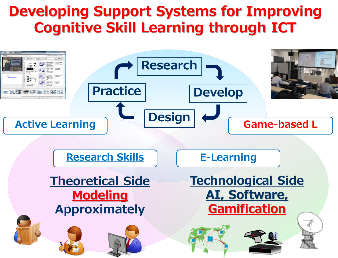
Interdisciplinary Research to Support Learning “How to Learn”
Laboratory on Learning Informatics
Professor:HASEGAWA Shinobu
E-mail:
[Research areas]
Learning Informatics, Learning Technology, Educational Technology
[Keywords]
AI in Education, Skill Learning, Self-directed Learning, Gamification, Distance Learning System
Skills and background we are looking for in prospective students
- Interest in human learning and/or education process.
- Essential knowledge for one of the fields of educational technology, artificial intelligence, software engineering, image/sound processing.
What you can expect to learn in this laboratory
Through research activities, you will be able to improve necessary research procedure such as setting of research topics, modeling of research subject, survey for related research, design/development/evaluation of support systems, etc. We recommend you should reconstruct your own working style by reflecting on your daily activities based on the understanding of trends in the research field and new information technology, associating research interests with your career. Furthermore, you will improve self-initiative and cooperative mind by making presentations for research findings, writing research articles, communicating with others.
【Job category of graduates】 Information Industries, education industries, school teachers, etc.
Research outline
 Nowadays, learners around the world can freely access high-quality learning resources on the Web. Improving such technology-enhanced learning is one of the central topics in learning technology research because such new learning environment decreases diverse constraints in the traditional educational settings and allows people learn from anytime and anywhere. The goal of our laboratory is to establish a systematic methodology to support learning “how to learn” by combining software engineering, image/sound processing, and artificial intelligent approach. To support “ICT in education,” we also have practical research topics including educational design and operational support in a distributed learning environment.
Nowadays, learners around the world can freely access high-quality learning resources on the Web. Improving such technology-enhanced learning is one of the central topics in learning technology research because such new learning environment decreases diverse constraints in the traditional educational settings and allows people learn from anytime and anywhere. The goal of our laboratory is to establish a systematic methodology to support learning “how to learn” by combining software engineering, image/sound processing, and artificial intelligent approach. To support “ICT in education,” we also have practical research topics including educational design and operational support in a distributed learning environment.
■Support for Self-directed WBL
Web-based Learning (WBL), in which we learn on the Web using a web browser, has the potential to achieve high learning effect by constructing knowledge structure by each learner. We have been developing support functions focusing on “meta-cognitive activities,” which means an activity by which learners recognize their learning process and improve it from meta (higher order) dimensions, in these self-directed WBL. Our goal for this topic is to provide an effective learning environment that the learners are aware of meta-cognitive activities by themselves.
■Support for Research Activities
We generate and use huge research contents in the laboratory as a part of our daily research activities. We have grasped such research activities as a type of community of practice and developed a research support system for novice research students through reorganizing informal information in the laboratory experience.
■Design for Distance Learning System
The design for distance learning system is complicated due to diverse requirements such as purpose and form of lecture and communication technology. We have focused on communication patterns occurring between remote sites and systematize past practice cases in a reusable form to improve design for distance learning system.
Key publications
- X. Zheng, S. Hasegawa, W. Gu, and K. Ota: Addressing Class Imbalances in Video Time-Series Data for Estimation of Learner Engagement: “Over Sampling with Skipped Moving Average," Educ. Sci. 2024, 14(6), 556.
- K. Takahashi, W. Gu, K. Ota, and S. Hasegawa, "An Academic Presentation Support System Utilizing Structural Elements," IEICE TRANSACTIONS on Information and Systems, No.4, pp.486-494, 2024.
- S. N. Karimah, H. Phan, Miftakhurrokhmat and S. Hasegawa, "Design Principle of an Automatic Engagement Estimation System in a Synchronous Distance Learning Practice," in IEEE Access, vol. 12, pp. 25598-25611, 2024,
Equiment
- Lecture Archiving System
- Video Conference System
- PC Conference System
Teaching policy
In our laboratory, we focus on improving the transferable skills required for society and industry through design, development, operation, and systematization of learning support environments for effective/comfortable human information processing process. We have rubrics as criteria for achievement degree of your research skills and have a couple of opportunities that you make self-evaluation in each milestone as a part of laboratory management. We also record daily research activities to an e-portfolio such as recording laboratory meetings and storing contents of the research discussion.
[Website] URL:https://dlc.jaist.ac.jp/shinobu/